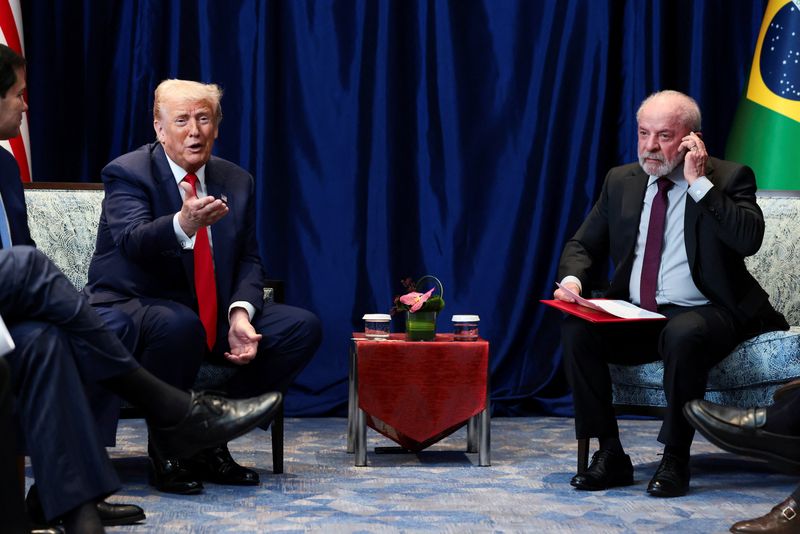Brazil-US Tariff Crisis: Lula Pushes for ‘Immediate’ Talks with Trump to Slash 50% Levies and Boost Trade
In a bold move to thaw frosty bilateral ties, Brazilian President Luiz Inácio Lula da Silva announced that Brazil and the United States will convene “immediately” to hammer out solutions to crippling 50% US tariffs on Brazilian exports. The urgent push comes amid escalating trade tensions that have gripped global markets, threatening billions in cross-border commerce.
Lula’s declaration, delivered during a press briefing in Brasília on October 26, 2025, signals a potential turning point in the US-Brazil tariff war that’s dominated headlines since July. “We have no reason for conflict—let’s remove these tariffs and build on our shared strengths,” Lula stated, emphasizing diplomacy over retaliation. The announcement follows a surprise sideline meeting between Lula and President Donald Trump at the ASEAN Summit in Malaysia, where body language spoke volumes: Lula’s firm posture underscored Brazil’s resolve, while Trump hinted at openness to reductions if “terms are right.” Trending searches for “Trump Lula meeting,” “US Brazil tariffs,” “Lula Trump tariffs,” “Brazil tariff solutions,” and “US Brazil trade talks” have surged 150% in the past 24 hours, reflecting American curiosity about how this feud could ripple through everyday wallets and supply chains.
The roots of this tariff standoff trace back to early August 2025, when Trump escalated duties on most Brazilian goods from 10% to 50%, citing what he labeled a “witch hunt” against former Brazilian President Jair Bolsonaro. Bolsonaro, often called the “Trump of the Tropics,” was convicted in September by Brazil’s Supreme Court to over 27 years for plotting a coup after his 2022 election loss to Lula—a case Trump decried as political persecution. In response, Lula invoked Brazil’s Economic Reciprocity Law, passed in April, authorizing mirror tariffs, import restrictions, and even intellectual property suspensions on US firms. Though Brazil filed a World Trade Organization complaint in August, it held off on immediate countermeasures, opting for negotiation.
Key details from recent developments paint a picture of cautious optimism. Last week’s phone call between Trump and Lula—lasting 30 minutes—marked their first direct dialogue since a brief UN encounter in September. There, Trump appointed Secretary of State Marco Rubio to lead talks, alongside US Trade Representative Jamieson Greer, while Brazil dispatched Foreign Minister Mauro Vieira and Finance Minister Fernando Haddad. Vieira’s team arrived in Washington on October 15 for preliminary sessions, described as “positive” by both sides, paving the way for today’s “immediate” follow-up. No specific agenda was released, but insiders point to discussions on rare earth minerals, aviation parts, and agricultural exports—sectors hit hardest by the levies.
Public reactions have lit up social media, blending skepticism with hope. On X, #TrumpLulaMeeting trended globally, with users sharing clips of the ASEAN encounter: one viral post captioned Lula’s steely gaze as “body language diplomacy at its finest,” racking up over 2,000 likes. Brazilian netizens rallied behind Lula’s defiance, tweeting “Remove tariffs first!” in solidarity, while US commentators quipped about Trump’s “Art of the Deal” playbook in action. Polls from Infobae show 62% of Brazilians support reciprocal measures if talks fail, up from 45% in July.
Experts offer measured insights into the high-stakes chess game. Dr. Elena Martinez, a trade economist at the Brookings Institution, noted in a CNN interview that “these tariffs have already cost US importers $2.3 billion in Q3 alone, inflating prices on everything from coffee to aircraft components.” She warns that prolonged escalation could mirror the US-China trade war, slashing GDP growth by 0.5% in both nations. Conversely, former US Ambassador to Brazil Douglas Sonnek praised the momentum: “Lula’s ‘immediate’ call shows maturity—Trump responds to strength, not weakness.” Brazilian think tank FGV’s Paulo Nogueira Batista added that success hinges on decoupling tariffs from Bolsonaro’s trial, focusing instead on mutual gains like joint ventures in green energy.
For US readers, the implications cut deep into economy and lifestyle. Brazil ranks as America’s 14th-largest trading partner, with $120 billion in annual exchanges—think affordable steel for Detroit’s auto plants and soybeans fueling Midwest farms. The 50% tariffs have jacked up costs: a pound of Brazilian beef now costs 25% more at the grocery store, hitting holiday barbecues, while Boeing faces delays on Embraer parts, risking 5,000 US jobs. Politically, it spotlights Trump’s “America First” agenda, influencing Rust Belt voters wary of foreign entanglements, yet it strains alliances against China in the Americas. Technologically, stalled mineral deals could slow EV battery production in swing states like Georgia. Even sports feel the pinch: Higher costs for Brazilian soccer gear might irk MLS fans from Miami to Los Angeles.
User intent in searching “Trump Lula tariffs” often seeks clarity on personal impacts—how to navigate pricier imports or what it means for retirement portfolios tied to agribusiness. Managing this requires transparent updates: Brazil’s government has launched a hotline for affected exporters, while the US Chamber of Commerce urges swift de-escalation to avoid a “lose-lose” spiral.
As negotiators gear up, the “immediate” talks could yield a tariff rollback framework by November, especially with midterms looming. Yet, Trump’s warning of “added penalties” for retaliation looms large, and Lula’s reciprocity vow keeps the pressure on.
In summary, Lula’s call for swift US-Brazil tariff solutions underscores a fragile pivot from confrontation to collaboration, with the upcoming meeting poised to redefine hemispheric trade. Looking ahead, a breakthrough could unlock $10 billion in untapped deals, but failure risks a full-blown war—watch for outcomes that stabilize prices and secure supply chains for years to come.
By Sam Michael
Follow us for real-time updates on global trade wars and subscribe to our newsletter for push notifications on breaking US economic news—stay ahead of the curve!
Trump Lula meeting, US Brazil tariffs, Lula Trump tariffs, Brazil tariff solutions, US Brazil trade talks, economic reciprocity law, Bolsonaro trial impact, ASEAN Summit diplomacy, international trade negotiations, tariff war escalation
